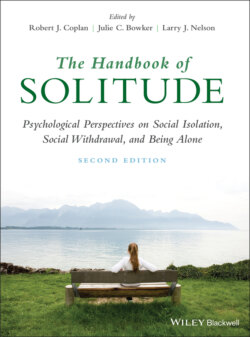Читать книгу The Handbook of Solitude - Группа авторов - Страница 44
The Importance of Understanding the Effects of Social Deprivation and Social isolation
ОглавлениеUnderstanding the impact of social deprivation and social isolation on healthy human functioning is critical for several reasons. Although most humans are raised by their primary caregivers such as mothers and/or fathers, and continue to form social bonds in later years, there are also wide variations in individuals’ social experiences. For example, around 2.7 million children are estimated to live in institutional care worldwide (Petrowski et al., 2017) and an important proportion of these children are deprived of stable, warm, and responsive caregiving provided by an attachment figure (Nelson et al., 2019). Given that children with a history of institutionalization have vastly varying experiences before, during, and, for some, after institutionalization, assessing the exact quality and quantity of children’s social experiences or the type of deprivation experienced is often challenging. Thus, animal studies are well suited for examining the impact of social deprivation given that they allow for manipulating the exact timing and duration of the deprivation. By allowing for greater “environmental control,” animal models can help manipulate the specific aspects of deprivation, such as deprivation of milk, tactile stimulation or presence/absence of the caregiver, to identify the mechanisms by which social deprivation leads to disruptions in development (Hofer, 1987). Finally, animal models can test whether specific enrichment experiences can reverse specific impacts of social deprivation.
Another important variation in children’s early social experiences concerns the family structure they grow up in. Some children are raised in biparental family units with opportunities to interact with two caregivers on a regular basis, whereas others are raised by single or widowed caregivers without opportunities to interact with a second caregiver. Animal research conducted with monogamous, biparental species allow researchers to examine whether growing up in single‐parent family units and/or experiencing “paternal deprivation” have differential effects on the development of the offspring. Additionally, many individuals experience social isolation during certain periods in their lives. Homeschooled children who also grow up without siblings or peers may be deprived of critical social experiences. Individuals who move to another location, change their schools or workplaces, or lose their loved ones can also experience social isolation. Thus, animal research on the effects of social isolation experienced later in life can inform human studies on whether such social isolation experiences lead to alterations in biology and behavior. Finally, understanding whether and how ordinary variations in these temperaments in animals may be associated with experiences of social isolation and health problems is critical.
